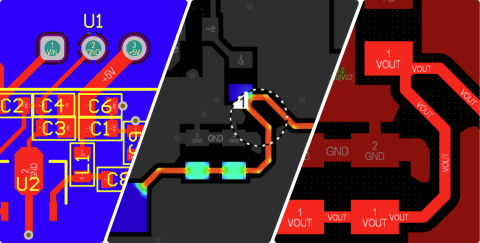Understanding Power Integrity in PCB Design: Power Analyzer by Keysight Whitepaper

Understanding Power Integrity in PCB Design: Power Analyzer by Keysight Whitepaper
In modern electronics, power distribution is no longer a simple matter of connecting traces and planes. As designs grow more complex, with high-speed digital logic, dense multilayer PCBs, and precision analog circuitry, the way power is delivered across the board can make the difference between a reliable product and one that fails in the field.
This whitepaper explores the critical role of power integrity analysis in PCB design, beginning with the physics of current density, resistivity, and voltage drop, and progressing toward practical, simulation-based insights using the Power Analyzer by Keysight, integrated within Altium’s software.
Why Power Analysis Matters
Real-world failures - from burnt fuse tracks to unpredictable ground bounce - often trace back to one root cause: uncontrolled current density and resistance in PCB copper features. Even a solid copper plane, while appearing ideal, exhibits non-zero resistance that can cause measurable voltage gradients and performance degradation in sensitive circuits. By understanding these effects early in the design phase, engineers can prevent costly redesigns, reliability issues, and even safety hazards.
From Fundamentals to Application
The whitepaper is structured in three key parts:
- Part I establishes the theoretical foundation covering: Ohm’s Law, material resistivity, current density, and their implications for PCB reliability.
- Part II presents two real-world use cases, including the design and analysis of a fuse track and the impact of PCB resistance on precision current-sensing circuits.
- Part III offers a step-by-step guide to performing power analysis directly within Altium’ software using the Power Analyzer by Keysight extension, enabling designers to visualize voltage drops, detect violations, and generate comprehensive reports - all without leaving the PCB layout environment.
A Smarter Way to Design for Power Integrity
By combining solid electrical theory with intuitive, simulation-driven design tools, this whitepaper demonstrates how engineers can transform power analysis from a late-stage verification step into a proactive design discipline. Whether optimizing a high-current path or validating a precision amplifier’s ground network, the Power Analyzer by Keysight provides the clarity needed to ensure both performance and safety in today’s complex electronic systems.
To extend this capability across your entire organization, discover how Altium Agile Teams helps turn power integrity insights into structured, repeatable workflows that align ECAD, MCAD, and system engineering teams:
Get Started.
Fill in the form below to download the full whitepaper on Power Analyzer by Keysight.


 Download PDF
Download PDF